| Listing 1 - 10 of 41 | << page >> |
Sort by
|
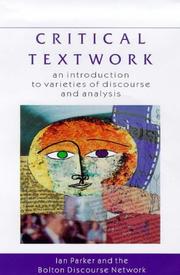
ISBN: 0335202047 Year: 1999 Publisher: Buckingham Open University Press
Abstract | Keywords | Export | Availability | Bookmark
 Loading...
Loading...Choose an application
- Reference Manager
- EndNote
- RefWorks (Direct export to RefWorks)
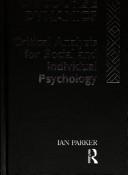
ISBN: 0415050189 Year: 1992 Publisher: London Routledge
Abstract | Keywords | Export | Availability | Bookmark
 Loading...
Loading...Choose an application
- Reference Manager
- EndNote
- RefWorks (Direct export to RefWorks)
Psycholinguistics --- Pragmatics --- Discourse analysis --- Psychological aspects.
Book
ISBN: 0415014948 041501493X Year: 1989 Publisher: London Routledge
Abstract | Keywords | Export | Availability | Bookmark
 Loading...
Loading...Choose an application
- Reference Manager
- EndNote
- RefWorks (Direct export to RefWorks)
Social psychology. --- Sociale psychologie --- handboeken en inleidingen --- handboeken en inleidingen.
Book
ISBN: 9781848722064 9781848722071 9781315774091 9781317683377 9781317683384 1848722079 1848722060 1315774097 Year: 2015 Publisher: London: Routledge,
Abstract | Keywords | Export | Availability | Bookmark
 Loading...
Loading...Choose an application
- Reference Manager
- EndNote
- RefWorks (Direct export to RefWorks)
Psychology After the Crisis Ian Parker has been a leading light in the fields of critical and discursive psychology for over 25 years. The Psychology After Critique series brings together for the first time his most important papers. Each volume in the series has been prepared by Ian Parker, features a newly written introduction and presents a focused overview of a key topic area. Psychology After the Crisis is the first volume in the series and addresses three important questions: - What was the crisis in psychology and why does it continue now? - How did debates regarding the traditional 'laboratory experiment' paradigm in psychology set the scene for discourse analysis? - Why are these paradigm debates now crucial for understanding contemporary critical psychology? The first two chapters of the book describe the way critical psychology emerged in Britain during the 1970s, and introduce four key theoretical resources: Marxism, Feminism, Post-Structuralism and Psychoanalysis. The chapters which follow consider in depth the critical role of Marxist thinking as an analytic framework within psychology. Subsequent chapters explore the application and limitations of critical psychology for crucial topics such as psychotherapy, counselling and climate change. A final chapter presents an interview which reviews the main strands within critical psychology, and provides an accessible introduction to the series as a whole. Psychology After the Crisis is essential reading for students and researchers in psychology, sociology, social anthropology and cultural studies, and for discourse analysts of different traditions. It will also introduce key ideas and debates in critical psychology for undergraduates and postgraduate students across the social sciences"
Critical psychology. --- Critical psychology --- Psychology. --- Psychology --- Movements --- Psychoanalysis. --- Social Psychology.
Book
ISBN: 9781848722149 9781848722156 9781315774046 9781317683223 9781317683230 1848722141 Year: 2015 Publisher: London: Routledge,
Abstract | Keywords | Export | Availability | Bookmark
 Loading...
Loading...Choose an application
- Reference Manager
- EndNote
- RefWorks (Direct export to RefWorks)
"Ian Parker has been a leading light in the fields of critical and discursive psychology for over 25 years. The Psychology After Critique series brings together for the first time his most important papers. Each volume in the series has been prepared by Ian Parker and presents a newly written introduction and focused overview of a key topic area. Psychology After the Unconscious is the fifth volume in the series and addresses three central questions: - Why is Freud's concept of the unconscious important today? - Does language itself play a role in the creation of the unconscious? - How does Lacan radicalize Freud's notion of the unconscious in relation to cultural research? The book provides a clear explanation of Freudian and Lacanian accounts of the unconscious. It also highlights their role in offering a new way of describing, understanding and working with the human subject in clinical settings and in cultural research. Part One shows how the unconscious is elaborated in Freud's early case studies in Studies on Hysteria, while Part Two focuses on Lacan's re-working of the unconscious and its relationship to language and culture in his influential public seminars. The book also provides access to key debates currently occurring in Freudian and Lacanian psychoanalysis, exploring both the clinical dimension and the consequences for psychological and cultural research. Psychology After the Unconscious is essential reading for students and researchers in psychology, psychosocial studies, sociology, social anthropology and cultural studies, and to psychoanalysts of different traditions engaged in academic research. It will also introduce key ideas and debates within critical psychology to undergraduates and postgraduate students across the social sciences"
Subconsciousness. --- Psychoanalysis. --- Psychology --- Movements --- Social Psychology. --- Lacan, Jacques, --- Freud, Sigmund, --- Subconsciousness --- Psychoanalysis --- Lacan, Jacques, - 1901-1981 --- Freud, Sigmund, - 1856-1939

ISBN: 0803974817 1446221563 0803974809 1857022785 1282562290 9786612562297 0857022784 9780857022783 9781446221563 9780803974807 9780803974814 9781446264751 1446264750 9780761957133 9780761957126 076195712X 9781446217962 1446217965 076195712X 0761957138 1446226174 1283881039 9781857022780 9781282562295 9781446226179 9781283881036 Year: 1999 Publisher: London ; Thousand Oaks, [Calif.] : Sage,
Abstract | Keywords | Export | Availability | Bookmark
 Loading...
Loading...Choose an application
- Reference Manager
- EndNote
- RefWorks (Direct export to RefWorks)
Putting forward the latest arguments on the discursive and postmodern turn in psychotherapy, the contributors reflect on the role of psychotherapy in contemporary culture, and the project of therapy is opened up to critical attention.
Psychology, Pathological. --- Deconstruction. --- Criticism --- Semiotics and literature --- Abnormal psychology --- Diseases, Mental --- Mental diseases --- Mental disorders --- Pathological psychology --- Psychology, Abnormal --- Psychopathology --- Neurology --- Brain --- Criminal psychology --- Mental health --- Psychiatry --- Psychoanalysis --- Diseases --- Psychotherapy --- Philosophy --- Psychiatry. --- Medicine and psychology --- Psychology, Pathological --- Klinische psychologie --- Psychotherapie. --- Philosophy. --- Psychotherapy.
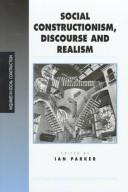
ISBN: 0761953779 Year: 1998 Publisher: London Sage
Abstract | Keywords | Export | Availability | Bookmark
 Loading...
Loading...Choose an application
- Reference Manager
- EndNote
- RefWorks (Direct export to RefWorks)
Discourse analysis. --- Social constructionism. --- Social psychology. --- Social sciences --- Subjectivity. --- Philosophy. --- Social psychology --- Discourse analysis --- -Subjectivity --- 316.6 --- #SBIB:309H511 --- Subjectivism --- Knowledge, Theory of --- Relativity --- Mass psychology --- Psychology, Social --- Human ecology --- Psychology --- Social groups --- Sociology --- Discourse grammar --- Text grammar --- Semantics --- Semiotics --- 316.6 Gedragstheorie. Sociaal gedrag. Sociale psychologie --(gedrag en zelfconcept van het individu in de groep z.o. {159.923.33}) --- Gedragstheorie. Sociaal gedrag. Sociale psychologie --(gedrag en zelfconcept van het individu in de groep z.o. {159.923.33}) --- Behavioral sciences --- Human sciences --- Sciences, Social --- Social science --- Social studies --- Civilization --- Philosophy --- Verbale communicatie: algemene pragmatiek, stilistiek en teksttheorie, discoursanalyse --- Social constructionism --- Subjectivity --- Social philosophy --- Social theory --- Constructionism, Social
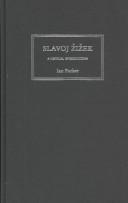
ISBN: 1783713526 1849641978 1281725471 9786611725471 1435661966 9781849641975 0745320724 0745320716 9780745320724 9780745320717 9781783713523 9781281725479 9781435661967 Year: 2004 Publisher: London ; Sterling, Va. : Pluto Press,
Abstract | Keywords | Export | Availability | Bookmark
 Loading...
Loading...Choose an application
- Reference Manager
- EndNote
- RefWorks (Direct export to RefWorks)
'When I read Ian Parker's manuscript, I experienced an underlying solidarity: despite obvious differences, we share the same basic political concerns and visions. And this makes his critical remarks always pertinent!' Slavoj Zizek 'This is not simply the best critical introduction to Zizek - in a much more radical sense, this is the only critical introduction to Zizek. Parker's study is much more than an important contribution to the ongoing debate: it redefines its very terms.' Yannis Stavrakakis, author of 'Lacan and the Political' 'A sharp, clear and radical analysis.' Christian Ingo Lenz Dunker, Professor of Psychoanalytic Theory and Lacanian Psychoanalyst, Sao Paulo, Brazil. Since the publication of his first book in English in 1989, Slavoj Zizek has quickly become one of the most widely read and contentious intellectuals alive today. With dazzling wit and tremendous creativity he has produced innovative and challenging explorations of Lacan, Hegel and Marx, and used his insights to exhilarating effect in analyses of popular culture. While Zizek is always engaging, he is also elusive and even contradictory. It can be very hard to finally determine where he stands on a particular issue. Is Zizek Marxist or Post-Marxist? How seriously should we take his recent turn to Christianity? Slavoj Zizek: A Critical Introduction shows the reader a clear path through the twists and turns of Zizek's writings. Ian Parker takes Zizek's treatment of Hegel, Lacan and Marx in turn and outlines and assesses Zizek's interpretation and extension of these thinkers' theories. While Parker is never hastily dismissive of Zizek's innovations, he remains critical throughout, aware that the energy of Zizek's writing can be bewitching and beguiling as well as engaging and profound.
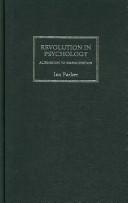
ISBN: 1849643237 1281733032 9786611733032 9781849643238 9780745325361 074532536X 9780745325354 0745325351 9781281733030 6611733035 Year: 2007 Publisher: London ; Ann Arbor, Mich. : Pluto Press,
Abstract | Keywords | Export | Availability | Bookmark
 Loading...
Loading...Choose an application
- Reference Manager
- EndNote
- RefWorks (Direct export to RefWorks)

ISBN: 1848609272 0761953760 0585333335 1446236617 1283880660 9781848609273 9780585333335 9780761953760 0761953779 9780761953777 9781446236611 9781283880664 9781446217412 1446217418 Year: 1998 Publisher: London ; Thousand Oaks, Calif. : SAGE Publications,
Abstract | Keywords | Export | Availability | Bookmark
 Loading...
Loading...Choose an application
- Reference Manager
- EndNote
- RefWorks (Direct export to RefWorks)
In this broad-ranging overview of the contemporary debates surrounding social constructionist perspectives in psychology the contributors map important connections between theory method and politics in social research.
Discourse analysis. --- Social psychology. --- Social sciences --- Subjectivity. --- Subjectivism --- Knowledge, Theory of --- Relativity --- Social philosophy --- Social theory --- Mass psychology --- Psychology, Social --- Human ecology --- Psychology --- Social groups --- Sociology --- Discourse grammar --- Text grammar --- Semantics --- Semiotics --- Philosophy. --- Social constructionism. --- Constructionism, Social --- Social psychology
| Listing 1 - 10 of 41 | << page >> |
Sort by
|

 Search
Search Feedback
Feedback About UniCat
About UniCat  Help
Help News
News